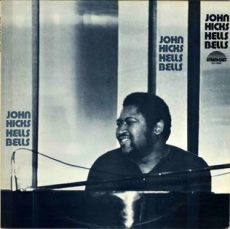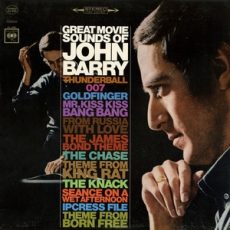
Daily Dose Of Jazz…
Terry Vosbein was born in New Orleans, Louisiana on February 8, 1957. He received his Masters in Composition from James Madison University and his Doctorate in Composition from the Cleveland Institute of Music. He has composed works for orchestra, wind ensembles, chamber ensembles and choirs. He has written works for jazz bands of all sizes and his compositions have been performed all over the world.
His latest release with the Knoxville Jazz Orchestra is titled Fleet Street and is infused with a sense of humor, adding a special dimension that is too often missing in contemporary big band writing. His 2009 Progressive Jazz album also with the Knoxville Jazz Orchestra has garnered critical acclaim.
He has been awarded seven residencies and a fellowship at University College in Oxford, where he composed Masque for Cello and Orchestra. Terry also teaches music composition at Washington and Lee University in Lexington, Virginia.
For over twenty-five years Vosbein was an active jazz bassist and arranger, performing and arranging for a variety of ensembles, including the Glenn Miller Orchestra and the Atlanta Pops. He has performed in a wide range of genres from country western twang to big band swing, disco and country club wallpaper, and continues to play a never ending assortment of jazz combos and studio sessions.
More Posts: arranger,bandleader,bass,composer,history,instrumental,jazz,music

Daily Dose Of Jazz…
Werner Dies was born on January 15, 1928 in Frankfurt, Germany. An autodidact on guitar and saxophone, he studied clarinet and composition starting in 1947. From 1947 to 1955 he played guitar in the dance band of Willy Berking, and was a member of the bands Hotclub Combo and Two Beat Stompers.
He led his own ensemble, went on a tour of Yugoslavia in 1955 and from 1955 to 1965 he was a member of Hazy Osterwald’s sextet, and also worked as a session musician and arranger. He toured with Joe Turner and, in 1968, Charly Antolini.
He had a hit in Germany in 1954 with Schuster bleib bei deinen Leisten (The Little Shoemaker) that spent eight weeks at #1 on the German hit parade starting in October 1954. He later worked for Howard Carpendale, Adam & Eve, Graham Bonney, and other singers, and produced easy listening music with his own ensemble, the Werner Dies Sax Band.
He wrote a treatise on clarinet improvisation that was published in 1967. He produced the group Bläck Fööss from 1973 to 2003. Tenor saxophonist, clarinetist, guitarist, composer, and arranger Werner Dies died on February 5, 2003.
More Posts: arranger,bandleader,clarinet,composer,guitar,history,instrumental,jazz,music,saxophone

Daily Dose Of Jazz…
John Josephus Hicks Jr. was born December 21, 1941 in Atlanta, Georgia, the eldest of five children. As a child he moved around the United States as his father, Rev. John Hicks Sr, took up jobs with the Methodist church. His mother was his first piano teacher after he began playing at six or seven in Los Angeles, California. He took organ lessons, sang in choirs and tried the violin and trombone. Once he learned to read music around the age of 11, he started playing the piano in church.
His development accelerated once his family moved to St. Louis, Missouri when Hicks was 14 and he settled on the piano. Attending Sumner High School and played in schoolmate Lester Bowie’s band, the Continentals, which performed in a variety of musical styles. Hicks worked summer gigs in the southern United States with blues musicians Albert King and Little Milton with the latter providing his first professional work in 1958.
He studied music in 1958 at Lincoln University in Pennsylvania, where he shared a room with drummer Ronald Shannon Jackson. He also studied for a short time at the Berklee School of Music in Boston, Massachusetts before moving to New York in 1963.
In New York, John first accompanied singer Della Reese, then went on to play with Joe Farrell, Al Grey, Billy Mitchell, Pharoah Sanders, Jimmy Witherspoon, Kenny Dorham and Joe Henderson before joining Art Blakey’s Jazz Messengers in 1964. From 1965 to 1967 he worked on and off with vocalist Betty Carter, then joined Woody Herman’s big band, where he stayed until 1970, playing as well as writing arrangements for the band.
From 1972 to 1973, Hicks taught jazz history and improvisation at Southern Illinois University. From the 1970s onward he had a prolific career as a leader recording his debut in England followed by fifty-three more albums and as a sideman he recorded 300.
Towards the end of his life, he taught at New York University and The New School in New York. In 2006 John played in a big band led by Charles Tolliver, recorded his final studio album On the Wings of an Eagle.
Pianist, composer and arranger John HIcks, whose collection of papers, compositions, video and audio recordings are held by Duke University, died from internal bleeding on May 10, 2006.
More Posts: arranger,bandleader,composer,history,instrumental,jazz,music,piano

Daily Dose Of Jazz…
John Barry was born John Barry Prendergast in York, England on November 3, 1933 the youngest of four children, his mother, a classical pianist, his father a projectionist. Raised in and around cinemas, this childhood background influenced his musical tastes and interests. He was educated at St. Peter’s School, York, and received composition lessons from Francis Jackson, Organist of York Minster.
Spending his national service in the British Army playing the trumpet and working from a correspondence course with jazz composer Bill Russo, after his service he worked as an arranger for the orchestras of Jack Parnell and Ted Heath. Forming his own band, the John Barry Seven, in 1957, they recorded hit records on EMI’s Columbia label. By 1959 he gained commissions to arrange music for other acts, and his career breakthrough was the BBC television series Drumbeat, when he appeared with the John Barry Seven.
He was employed by EMI from 1959 until 1962 arranging orchestral accompaniments for the company’s singers. He began composing songs and scores for films and when Adam Faith made his first film, Beat Girl in 1960, Barry composed, arranged and conducted the film score, his first. His music was later released as the UK’s first soundtrack album. His composition and orchestration caught the attention of the Bond producers and he went on to have an accomplished career as a composer and arranger with the series.
In 2001, the University of York conferred an honorary degree on Barry, and in 2002 he was named an Honorary Freeman of the City of York. Fiancial issues in Britain forced him to emigrate to the United States where he lived for many years mainly in Oyster Bay, New York, in Centre Island on Long Island
He suffered a rupture of the esophagus in 1988, following a toxic reaction to a health tonic he had consumed. The incident rendered him unable to work for two years and left him vulnerable to pneumonia.
Composer, arranger and conductor John Barry, who won five Academy Awards and four Grammy Awards with scores for Born Free, The Lion in Winter, Midnight Cowboy and Somewhere in Time, died of a heart attack on January 30, 2011 at his Oyster Bay home, aged 77.
More Posts: arranger,composer,conductor,history,instrumental,jazz,music

Daily Dose Of Jazz…
John Funkhouser was born on October 16, 1966 in Boston, Massachusetts and studied classical piano from the age of seven, and classical bass starting at nine. He earned a B.A. in Musicology at Cornell University and returned to Boston to earn a Master’s degree from New England Conservatory in jazz piano, bass and composition in 1995. After a year performing in Singapore and four years performing and teaching in New York City, he again returned to Boston in 2000. This move was to raise a family, perform, and accept a job at Berklee College of Music, where he taught ear training, piano, bass, harmony, and ensembles until 2021.
Performing a wide spectrum of music, including all types of jazz, funk, rock, hiphop, Indian classical music, reggae, other world music and Western classical music, John is in equal demand as a jazz bassist and pianist. He has performed and/or recorded with Grammy winners Joe Lovano, Charles Neville, Steve Gadd, Abe Laboriel Sr., Luciana Souza, Mark Walker, Max Weinberg and Grammy nominees Bobby Watson, Francisco Mela, and Tierney Sutton.
In addition he has performed with among others Geri Allen, Bill Pierce, Joe Hunt, Herb Pomeroy, Francisco Mela, and Rebecca Cline. He leads Piandia, a duo specializing in Indian classical music, with tabla player Jerry Leake and the John Funkhouser Group, and has toured the U.S., Europe, Africa and Asia several times with both bands.
Pianist, bassist, arranger, and producer John Funkhouser, whose discography catalogue includes over 80 compact discs, currently resides, performs and teaches in Albuquerque, New Mexico.
More Posts: arranger,history,instrumental,jazz,music,piano,producer






